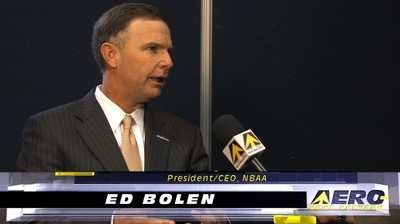Associations Thankful Congress Is Moving Forward On The One-Year Extension, But Know Heaving Lifting Is Still To Come
Aviation advocacy associations are generally offering praise to House and Senate leaders for reaching agreement on an FAA funding extension through the end of the next fiscal year. However, they also universally chide Congress for not being able to come up with a long-term solution for funding the agency, and what is missing from the bill.

“While we have always believed that the best outcome in the FAA reauthorization debate is to have a long-term bill for the agency, we commend the House and Senate committee leaders for providing this 14-month funding extension, which reflects a recognition by Congress that it is imperative to ensure that the FAA continues to have the resources needed for its critical safety, infrastructure and other programs,” Bolen (pictured) said.
“This extension is also important because of what it includes, and what it leaves out,” Bolen continued. “For example, we are pleased that the bill reflects some key general aviation priorities, such as the inclusion of third-class medical reform for pilots of small aircraft, and provisions focused on the safe integration of unmanned aircraft systems into the airspace.
“Equally important, the bill does not include risky proposals for creating a privatized air traffic control system, funded through new user fees,” Bolen added. “Clearly, our community’s tremendous mobilization against ATC privatization funded by user fees has made a difference.”
Bolen noted that the House and Senate still need to vote on the FAA extension bill for it to go into effect, and that NBAA and its members would remain vigilant on the matter as each chamber considers the legislation.
“We look forward to full House and Senate passage of the extension, but more importantly, we will continue working with both the House and Senate toward a full FAA reauthorization bill that enjoys strong bipartisan support and preserves America's world-leading position in aviation, five, 10 and 25 years from now."
“Based on the summary released today by the House Transportation Committee, while not a perfect solution, this authorized extension provides stability to the agency and takes action on a number of high priority safety and security issues,” said NATA president and CEO Thomas L. Hendricks.

“Most important, the legislation does not act on a proposal to corporatize our nation’s air traffic control system. While it was a debate worth having, radical change to the FAA’s management structure and funding poses risks to the safe and stable nature of the world’s best air traffic control system. We are pleased that lawmakers ultimately recognized that such a proposal will place general aviation in constant peril, starve rural America of access to cutting-edge technology, and saddle the traveling public with ever increasing fees.”
“More remains to be done,” concluded Hendricks (pictured), “both the House and Senate FAA bills contain other important provisions to help the FAA operate more efficiently, including streamlining the aircraft certification process and improving its regulatory consistency. We look forward to working with Congress to enact that legislation early in 2017.”

"Although we are pleased that Congress is nearing agreement to fund the agency through Sept. 30, 2017, it is disappointing that we face another short-term fix instead of a long-term reauthorization bill that is critical for strategic planning and NextGen implementation," said AEA President Paula Derks (pictured).
GAMA called the bill a missed opportunity to support small aircraft manufacturers.
“The decision to introduce a short-term extension of FAA programs into 2017, while necessary to keep the agency operating, is a missed opportunity for significant certification and regulatory reform," GAMA president and CEO Pete Bunce said in a statement. "The extension does contain a provision to reform the third-class medical system but it fails to address the broader certification and regulatory changes needed to improve safety, provide more consistency in regulatory interpretation, and keep the U.S. aviation industry competitive in the global economy. There is no excuse for this inaction, particularly when parties in both chambers agree on the importance of these reforms. The result will be the continued inefficient use of industry and FAA resources, and ensure that general aviation manufacturers continue to face unnecessary obstacles to creating jobs and selling their products.

“The certification reforms in both the original House Transportation and Infrastructure Committee-passed bill and Senate-passed bill are very similar and could be implemented quickly to address market and regulatory challenges the industry faces. They would have an immediate, positive impact and contribute to industry growth and employment in a difficult economic environment.
“Unfortunately, with the U.S. Congress choosing not to act on these critical reforms, general aviation manufacturers, maintenance, repair, and overhaul facilities, their respective employees, and their supplier networks are the ones who will lose," Bunce (pictured) said. "While it’s easy to talk the talk about the importance of manufacturing and related jobs in the United States, Congress has missed an important chance to match its words with actions. We hope that members of Congress will recommit themselves to passing these reforms as quickly as possible and well before the September 30, 2017 deadline established in this extension.”
(Source: Association news releases. Images from file)
 Aero-News: Quote of the Day (12.18.25)
Aero-News: Quote of the Day (12.18.25) Classic Aero-TV: Viking Twin Otter 400--Bringing the DHC-6 Back Into Production
Classic Aero-TV: Viking Twin Otter 400--Bringing the DHC-6 Back Into Production NTSB Final Report: Rans Employee Flying Club Rans S-6ES Coyote II
NTSB Final Report: Rans Employee Flying Club Rans S-6ES Coyote II ANN FAQ: Submit a News Story!
ANN FAQ: Submit a News Story! ANN's Daily Aero-Term (12.18.25): Braking Action Advisories
ANN's Daily Aero-Term (12.18.25): Braking Action Advisories






